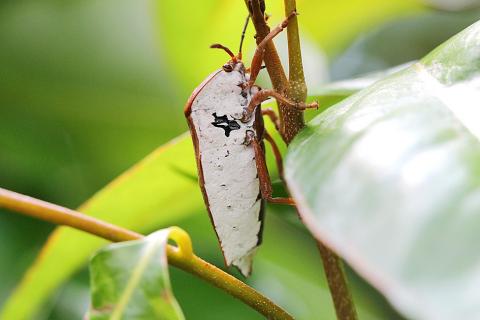The Council of Agriculture (COA) yesterday alerted farmers to an increase in the breeding activity of lychee stink bugs as the weather turns warmer, advising them to use biological methods to combat the insects when fruit trees begin to blossom.
Lychee stink bugs (Tessaratoma papillosa), which are often found on lychee, longan, Taiwan golden-rain and Chinese soapberry trees, are considered pests by farmers, as they feed on sprouts, the council said.
As they last year caused serious damage to domestic lychee and longan production, the council has planned pre-emptive measures after meeting with local officials and farmers, COA Chief Secretary Chang Chih-sheng (張致盛) told a news conference in Taipei, but added that statistics for such agricultural losses were not available yet.

Photo courtesy of the Kaohsiung District Agricultural Research and Extension Station
Domestic fields growing lychee and longan plants amount to 20,000 hectares, an important crop in central and southern regions, he said.
The stink bugs often hide in winter and start breeding when spring approaches, so it is crucial to restrict their breeding earlier, he added.
Farmers should immediately remove leaves on which stink bug eggs are found, Chang said.
The council last month started applying chemical solutions on fruit trees in key production regions, he said.
However, the use of insecticides should be stopped when plants begin to blossom — the time of which varies depending on region — and the council would then utilize one of the stink bug’s natural enemies — Anastatus japonicus, a species of egg parasite wasp — to restrict their breeding, he added.
The council last year released 4.05 million wasps and this year plans to deploy 16.6 million wasps at lychee and longan farms in Kaohsiung, Taichung, Tainan and Keelung, as well as Yilan, Miaoli, Changhua, Nantou and Kinmen counties, said Lu Hsiu-ying (呂秀英), director of the COA’s Miaoli District Agricultural Research and Extension Station, which last year employed uncrewed aerial vehicles to release the wasps.
Originally an alien species, lychee stink bugs were first spotted in outlying Kinmen about 20 years ago and later spread to Kaohsiung and other areas, COA Bureau of Animal and Plant Health Inspection and Quarantine Deputy Director-General Chou Hui-chuan (鄒慧娟) said.

Taiwanese can file complaints with the Tourism Administration to report travel agencies if their activities caused termination of a person’s citizenship, Mainland Affairs Council Minister Chiu Chui-cheng (邱垂正) said yesterday, after a podcaster highlighted a case in which a person’s citizenship was canceled for receiving a single-use Chinese passport to enter Russia. The council is aware of incidents in which people who signed up through Chinese travel agencies for tours of Russia were told they could obtain Russian visas and fast-track border clearance, Chiu told reporters on the sidelines of an event in Taipei. However, the travel agencies actually applied

Japanese footwear brand Onitsuka Tiger today issued a public apology and said it has suspended an employee amid allegations that the staff member discriminated against a Vietnamese customer at its Taipei 101 store. Posting on the social media platform Threads yesterday, a user said that an employee at the store said that “those shoes are very expensive” when her friend, who is a migrant worker from Vietnam, asked for assistance. The employee then ignored her until she asked again, to which she replied: "We don't have a size 37." The post had amassed nearly 26,000 likes and 916 comments as of this

New measures aimed at making Taiwan more attractive to foreign professionals came into effect this month, the National Development Council said yesterday. Among the changes, international students at Taiwanese universities would be able to work in Taiwan without a work permit in the two years after they graduate, explainer materials provided by the council said. In addition, foreign nationals who graduated from one of the world’s top 200 universities within the past five years can also apply for a two-year open work permit. Previously, those graduates would have needed to apply for a work permit using point-based criteria or have a Taiwanese company

The Shilin District Prosecutors’ Office yesterday indicted two Taiwanese and issued a wanted notice for Pete Liu (劉作虎), founder of Shenzhen-based smartphone manufacturer OnePlus Technology Co (萬普拉斯科技), for allegedly contravening the Act Governing Relations Between the People of the Taiwan Area and the Mainland Area (臺灣地區與大陸地區人民關係條例) by poaching 70 engineers in Taiwan. Liu allegedly traveled to Taiwan at the end of 2014 and met with a Taiwanese man surnamed Lin (林) to discuss establishing a mobile software research and development (R&D) team in Taiwan, prosecutors said. Without approval from the government, Lin, following Liu’s instructions, recruited more than 70 software